With countless blankets that we refer to as “kantha throws”, “kantha quilts“, “indigo kantha”, or “kantha blankets“, you might simply awe, what is kantha? and often wondered to know more about – History of Kantha –
Kantha (simply means : “patched cloth”) refers to both the tradition of producing these unique, colorless quilted blankets (making something useful and alluring out of discarded and unused items), as well as the craft and stitch itself (a small, straight running stitch specially in Bengali embroidery).
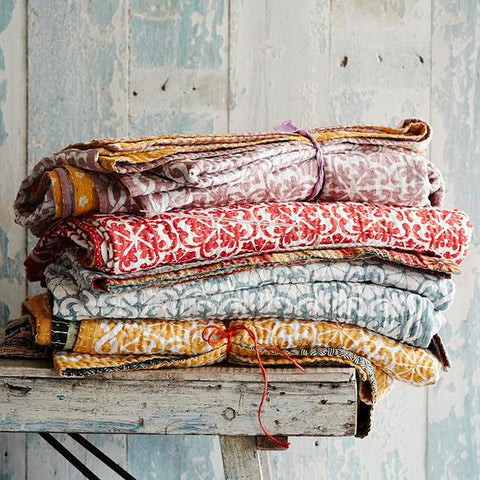
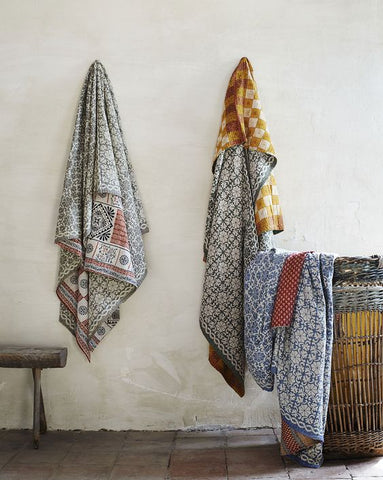
WHERE DOES ORIGINAL KANTHA ORIGINATE?
Kantha is a classical type of embroidery native to eastern South Asia, in particular Bangladesh and the neighbouring Indian states of West Bengal and Odisha, along the Bay of Bengal. For this logic, it is treated a craft of the Bengal region (“Bengali”), which is not the same as Bangladeshi (meaning, of the country of Bangladesh).
All of our kantha blankets are hand-stitched in Bengal, India. Formally, it is pronounced KAHN-taa, (nevertheless we will unofficially continue to incorrectly call it “can-tha”).
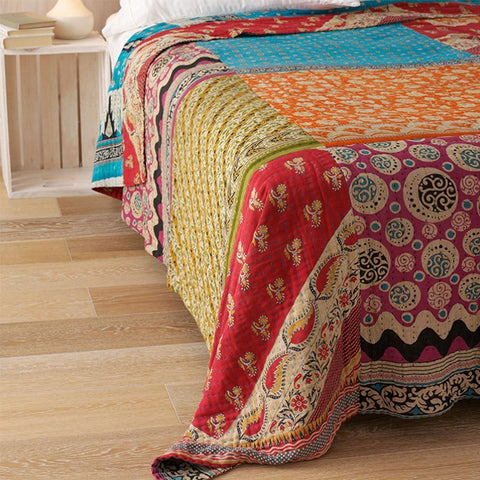
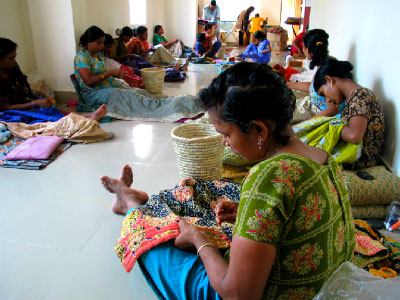
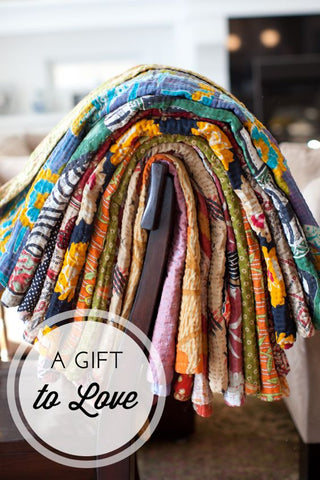
For as many as 500 centuries, impoverished Bengali women have taken their discarded cloth scraps and sewn them together with a simple running stitch; taking the old and reimposing it into something useful and possessive. Far from trend-setting, or even artfulness, kantha was constructed originally for the most basic and practical aspiration: to keep warm.
Over time, kantha developed as a generational artistry, a craft that could symbolically impart story, desire, and well-wishing for loved ones & gift recipients. Elaborate kantha were made as wedding gifts or gifts for mothers and for generations, with stories, history and wishes weaved in, allowing illiterate women to leave a eternal mark.
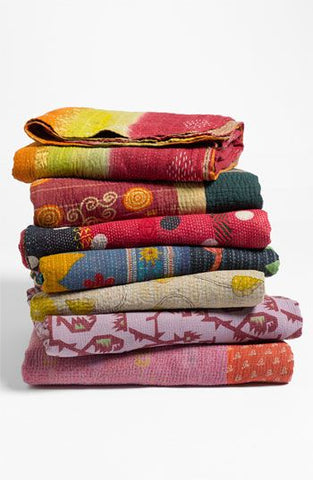
Kantha Today :
Today, the rich tradition of kantha has attained popularity in the West; no surprise, given the beauty, intricacy, and “wow” factor of each piece.
As we culturally trend away from disposable consumer goods, and en-route meaningful, well stitched goods with a low environmental buffet, Kantha blankets happily fit the bill.
The cloth is repurposed, which means no new dyes or inks (except for the environmentally happy natural indigo blankets), no by-products of production; the only factory-produced supplies we use are thread and new, undyed, natural cotton (for our modern quilts).
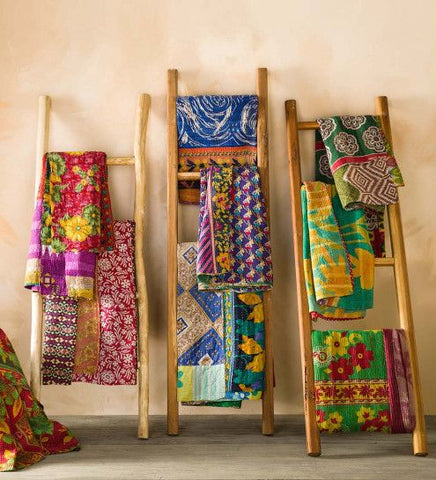
Our kantha blankets — sometimes called sari quilts or homemade quilts— are not made of rugs, nor do they feature deliberately designed stitch patterns. But, they are indeed formed and fashioned from old cloth that has been junked and is ready for new life.
Our “special” silk-blend blankets are made from silk-blend cloth discarded by the producers for flaws, colour variation, out-dated arrangement, or as remnants. All the cloth that makes kantha blankets sold at Jaipur Handloom is sourced mainly in West Bengal.
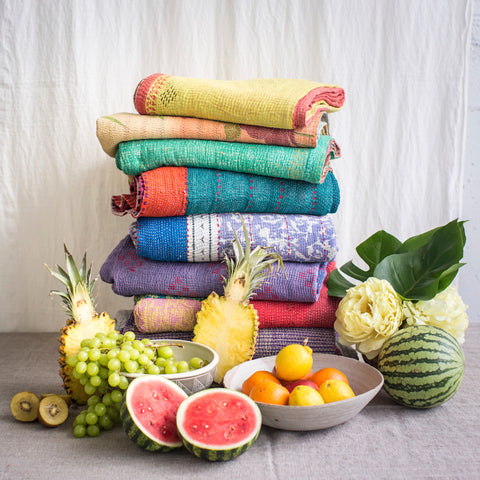
All of vintage kantha quilts & other goods are made at Jaipur Handloom has following features:
Thickness: Each layer of sari cloth is very thin (imagine a soft muslin for a baby swaddle), so if there are only 2, the blanket will be very light. The standard one is 3 layered. This is the most common thickness in the native regions, but region where cold in heavy there generally 6 layered are used to keep the body warm.
Our kantha quilts are made with 3 layers of sari cloth. We also accept customized orders where we construct quilts based on requirement of customers – pattern ,size and other. The final product is still not bulky, but definitely as “robust” as kantha come. They are light weighted, but provide a good warmth, as well. (Any kantha made with new cloth, like our modern paisley, fruit and floral blanket, have additional thickness & weight) and are accepted worldwide.
Stitching : How heavy do you expect the running stitches to be? A blanket with very tight, close stitching will have a more stark, generous feel than stitching that is farther apart.
Edge Stitching : This is where a more inexpensively produced, lower quality kantha will divulge itself. A well-made kantha should have a straight edge, with a kantha stitch right up to the edge, hinder any erode or interior cloth coming out.
Our kantha are stitched with rigor all around!
Color / Fading : Keep in mind that if a kantha quilt features faded or very pastel colors, it is more likely that the fabric has been more frequently washed, or is old; the fibres may break down more quickly than other fabrics. Consider this as uniqueness and charm as these are rare. Women in Bengal (who are originally wearing these saris) love different color & vibrance, so these are what you will (should) mostly find with authentic kantha blankets.
Cost : Of course, we are all cost-conscious. But, there is a large amount of labour involved in generating even a single kantha throw. Our kantha throws take, on average, 24-48 hours to handcraft and for final finish. Our kantha blankets are all made in a generous, safe, whole-hearted business by vulnerable & at-risk women who can work with dignity and work to earn livelihood.
We have a strong belief from our products and are confident that you won’t find a kantha that is as unique, colourful, versatile, rich in story, or as well-constructed as our hand-stitched kantha quilts.
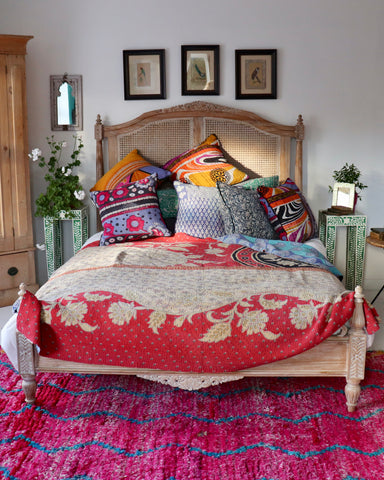
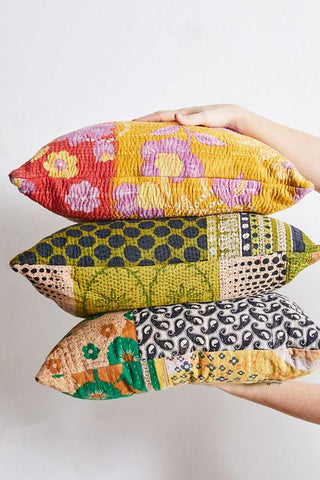
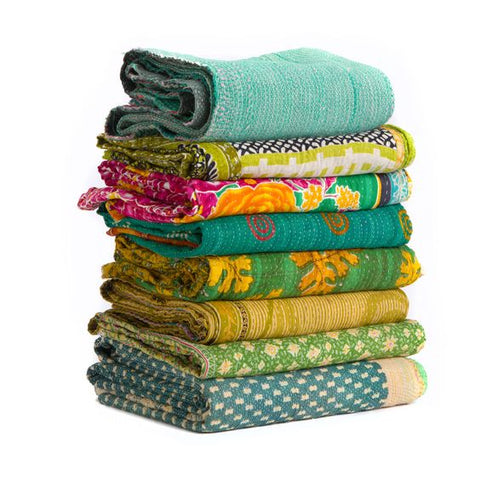
Contact us to know more about patterns and vibrant colors of kantha quilts and other kantha handmade products


What is Kantha? | History of Kantha | Untold Story of Vintage Kantha Quilt
With countless blankets that we refer to as “kantha throws”, “kantha quilts“, “indigo kantha”, or “kantha blankets“, you might simply awe, what is kantha? and often wondered to know more about – History of Kantha –
Kantha (simply means : “patched cloth”) refers to both the tradition of producing these unique, colorless quilted blankets (making something useful and alluring out of discarded and unused items), as well as the craft and stitch itself (a small, straight running stitch specially in Bengali embroidery).
WHERE DOES ORIGINAL KANTHA ORIGINATE?
Kantha is a classical type of embroidery native to eastern South Asia, in particular Bangladesh and the neighbouring Indian states of West Bengal and Odisha, along the Bay of Bengal. For this logic, it is treated a craft of the Bengal region (“Bengali”), which is not the same as Bangladeshi (meaning, of the country of Bangladesh).
All of our kantha blankets are hand-stitched in Bengal, India. Formally, it is pronounced KAHN-taa, (nevertheless we will unofficially continue to incorrectly call it “can-tha”).
For as many as 500 centuries, impoverished Bengali women have taken their discarded cloth scraps and sewn them together with a simple running stitch; taking the old and reimposing it into something useful and possessive. Far from trend-setting, or even artfulness, kantha was constructed originally for the most basic and practical aspiration: to keep warm.
Over time, kantha developed as a generational artistry, a craft that could symbolically impart story, desire, and well-wishing for loved ones & gift recipients. Elaborate kantha were made as wedding gifts or gifts for mothers and for generations, with stories, history and wishes weaved in, allowing illiterate women to leave a eternal mark.
Kantha Today :
Today, the rich tradition of kantha has attained popularity in the West; no surprise, given the beauty, intricacy, and “wow” factor of each piece.
As we culturally trend away from disposable consumer goods, and en-route meaningful, well stitched goods with a low environmental buffet, Kantha blankets happily fit the bill.
The cloth is repurposed, which means no new dyes or inks (except for the environmentally happy natural indigo blankets), no by-products of production; the only factory-produced supplies we use are thread and new, undyed, natural cotton (for our modern quilts).
Our kantha blankets — sometimes called sari quilts or homemade quilts— are not made of rugs, nor do they feature deliberately designed stitch patterns. But, they are indeed formed and fashioned from old cloth that has been junked and is ready for new life.
Our “special” silk-blend blankets are made from silk-blend cloth discarded by the producers for flaws, colour variation, out-dated arrangement, or as remnants. All the cloth that makes kantha blankets sold at Jaipur Handloom is sourced mainly in West Bengal.
All of vintage kantha quilts & other goods are made at Jaipur Handloom has following features:
Thickness: Each layer of sari cloth is very thin (imagine a soft muslin for a baby swaddle), so if there are only 2, the blanket will be very light. The standard one is 3 layered. This is the most common thickness in the native regions, but region where cold in heavy there generally 6 layered are used to keep the body warm.
Our kantha quilts are made with 3 layers of sari cloth. We also accept customized orders where we construct quilts based on requirement of customers – pattern ,size and other. The final product is still not bulky, but definitely as “robust” as kantha come. They are light weighted, but provide a good warmth, as well. (Any kantha made with new cloth, like our modern paisley, fruit and floral blanket, have additional thickness & weight) and are accepted worldwide.
Stitching : How heavy do you expect the running stitches to be? A blanket with very tight, close stitching will have a more stark, generous feel than stitching that is farther apart.
Edge Stitching : This is where a more inexpensively produced, lower quality kantha will divulge itself. A well-made kantha should have a straight edge, with a kantha stitch right up to the edge, hinder any erode or interior cloth coming out.
Our kantha are stitched with rigor all around!
Color / Fading : Keep in mind that if a kantha quilt features faded or very pastel colors, it is more likely that the fabric has been more frequently washed, or is old; the fibres may break down more quickly than other fabrics. Consider this as uniqueness and charm as these are rare. Women in Bengal (who are originally wearing these saris) love different color & vibrance, so these are what you will (should) mostly find with authentic kantha blankets.
Cost : Of course, we are all cost-conscious. But, there is a large amount of labour involved in generating even a single kantha throw. Our kantha throws take, on average, 24-48 hours to handcraft and for final finish. Our kantha blankets are all made in a generous, safe, whole-hearted business by vulnerable & at-risk women who can work with dignity and work to earn livelihood.
We have a strong belief from our products and are confident that you won’t find a kantha that is as unique, colourful, versatile, rich in story, or as well-constructed as our hand-stitched kantha quilts.
Contact us to know more about patterns and vibrant colors of kantha quilts and other kantha handmade products
Related Posts
Kantha Pillow Magic: Unraveling the Artistry and Elegance of Handcrafted Home Decor
The Art of Handstitched Kantha Quilts: A Beautiful Transformation of Upcycled Saris
Choosing the Perfect Kantha Quilt A Buyer's Guide